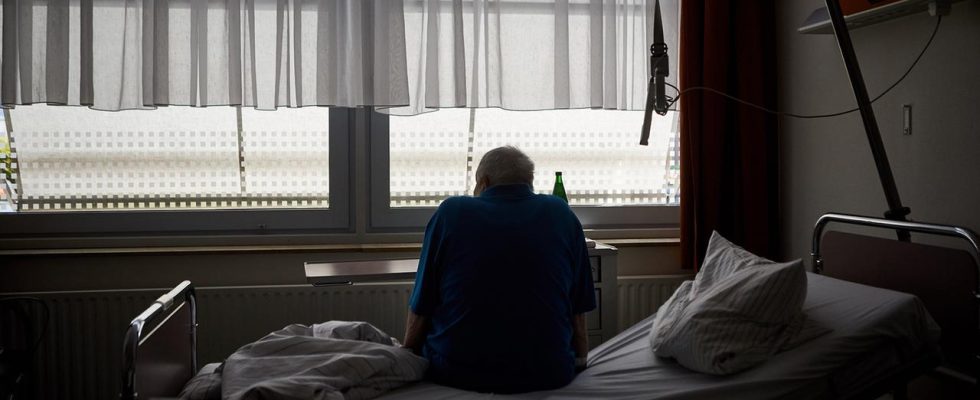Around one in six hospital patients suffers from dementia or symptoms of dementia. Many clinics are inadequately equipped to deal with these patients who require intensive care.
Katja K. is still angry when she thinks about her mother’s hospital stay in the summer of 2021. The 78-year-old demented woman had to be hospitalized because of a broken femur. “During the days she was in the hospital, my mother transformed from an agile person into a pile of misery,” says K.
Her accusation: The clinic did not take appropriate care of her mother, even though she was informed about the dementia. No one ensured that the weakened and confused woman, who also had difficulty speaking, was eating and drinking enough.
She repeatedly pointed this out to the nursing staff – to no avail. Instead, her mother was described as “uncommunicative.” K. then independently extended the maximum visiting time of one hour due to the Corona restrictions in force at the time in order to at least help her mother eat. The memory of her mother’s stay in the hospital still bothers K. today, two years later.
Clinic sees “no wrongdoing”
When asked, the clinic in question stated that it could not identify “any wrongdoing.” Contact with relatives was particularly important for dementia patients – but was only possible to a limited extent due to Corona. But the clinic also writes: For dementia patients, a hospital stay represents a great burden “due to the unfamiliar surroundings, the many unknown people and the regular daily routines.”
Sabine Carstens also had this experience. She is an experienced nurse herself. But when her 81-year-old demented mother had to be hospitalized for intestinal bleeding in March 2022, she felt completely helpless. She wasn’t allowed to visit her mother for days – the reason here too: Corona measures.
The result: Her mother no longer knew where she was, she stopped eating and drinking and lost weight. Inadequate care ultimately led to a painful pressure sore. Particularly tragic for Carstens: her mother died two months later.
“The will to live has been taken away from her,” says Carstens. The clinic concerned objects. Visits were possible every day, but the reported weight loss could not be confirmed. The patient was cared for “comprehensively,” according to the answer to questions from MR.
“Dangerous places” for people with dementia
As part of the research, other affected people contacted him MR. Relatives in particular always have the feeling that old, confused patients are not cared for enough in German clinics. Those affected feel overwhelmed and helpless at the hands of ignorant hospital operations.
The scientist Sabine Kirchen-Peters can understand this feeling. She works at the Institute for Social Research and Social Economy in Saarbücken on the topic of dementia care. For people with dementia, hospitals are “dangerous places,” said Kirchen-Peters. It’s about efficiency and the fastest, most economically viable treatment possible. But this doesn’t work for people with dementia or symptoms of dementia: “They can’t adapt to the procedures, the structure starts to falter, sand gets in the way.”
The patients refuse treatment, don’t understand doctors, wander about the aisles, don’t eat or drink. This has consequences: nursing staff who are already stressed and overwhelmed are placed under additional strain. Dementia symptoms often worsen acutely in those affected. The risk of having to go back to the clinic shortly after treatment increases by up to 35 percent, according to one Study by the Robert Bosch Foundation on the topic of “Dementia in general hospitals” from November 2019.
debate about the Hospital reform
But it is also a fact: the proportion of old patients in German clinics is increasing. And with it the proportion of people with symptoms of dementia. That’s why more and more clinics are now developing concepts for “dementia sensitivity,” says Kirchen-Peters. What is missing are political incentives.
Kirchen-Peters also misses this in the current debate about hospital reform: “I would have liked to have taken advantage of the opportunity to also negotiate standards for dementia care.” So far, for example, each clinic has been able to define for itself what it means by “dementia-sensitive”.
The German Hospital Society (DKG), however, sees no need for action. The topic of dementia is not one for the upcoming hospital reform, according to DKG board chairman Gerald Gaß: “When it comes to dementia sensitivity, the hospitals are already on the right track – without any additional bureaucracy.” The hospital reform must address fundamental questions of reorganization, financing and security of supply.

